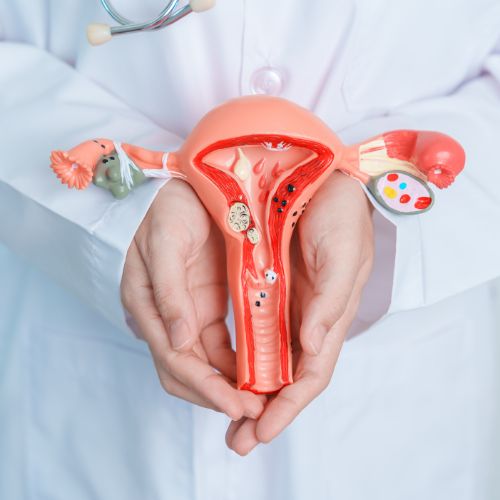Understanding PCOD/PCOS
PCOD/PCOS is a hormonal disorder that affects women of reproductive age. It is characterized by hormonal imbalances, irregular menstrual cycles, and the presence of small cysts on the ovaries. Common symptoms include irregular periods, weight gain, acne, and excessive hair growth.
- Irregular menstrual cycles
- Excessive hair growth (hirsutism)
- Acne
- Weight gain
- Difficulty getting pregnant
- Mood swings
- Insulin resistance
Polycystic Ovary Syndrome (PCOS) and Polycystic Ovarian Disorder (PCOD) share some similarities but differ significantly in terms of underlying mechanisms and implications.
Key Points of Differentiation
- Presence of Follicles: PCOD consists of multiple small cysts in the ovaries, while PCOS includes enlarged ovaries containing numerous small cysts.
- Causes: PCOD is a benign finding, whereas PCOS is a hormonal disorder involving insulin resistance and excess androgen production.
- Prevalence: PCOD is more common, occurring in 19%-33% of women, while PCOS impacts 5%-10% of women aged 15-44.
- Complications: PCOS leads to complications such as diabetes, cardiovascular disease, and pregnancy difficulties, whereas PCOD does not cause major complications.
- Symptoms: PCOS presents with symptoms like irregular periods, acne, excess hair growth, and difficulty conceiving, while PCOD may not present any noticeable symptoms.
- Treatments: PCOD requires little intervention unless other symptoms arise, while PCOS necessitates treatment focused on hormonal balancing, ovulation promotion, and addressing metabolic concerns.
In summary, PCOS is a metabolic condition characterized by hormonal imbalances, insulin resistance, and excess androgen production, resulting in a multitude of symptoms and complications. On the other hand, PCOD is simply the presence of multiple small cysts in the ovaries, which may not necessarily cause symptoms or complications.
Diagnosis and Treatment
At Khandelwal Clinic, we offer comprehensive diagnosis and treatment options for PCOD/PCOS, including:
- Medical History and Physical Exam: Evaluation of symptoms and physical examination to assess overall health.
- Blood Tests: Hormone level testing to identify imbalances.
- Ultrasound: Imaging test to visualize the ovaries and detect cysts.
- Lifestyle Modifications: Dietary changes, regular exercise, and weight management to improve symptoms.
- Medication: Hormonal therapy or insulin-sensitizing medications to regulate menstrual cycles and manage symptoms.
- Fertility Treatment: Options for women trying to conceive, such as ovulation induction or assisted reproductive technologies.
Managing PCOD/PCOS
- Healthy Diet: A balanced diet rich in fruits, vegetables, whole grains, and lean proteins can help manage symptoms.
- Regular Exercise: Physical activity can aid in weight management and improve insulin sensitivity.
- Stress Management: Techniques such as yoga, meditation, or counseling can help reduce stress levels.
- Medication Compliance: Adhering to prescribed medications as directed by healthcare providers is crucial for symptom management.
Dr. Vidhu Khandelwal and our team at Khandelwal Clinic are dedicated to providing compassionate care and personalized treatment plans for women dealing with PCOD/PCOS. Our goal is to address hormonal imbalances, manage symptoms effectively, and improve quality of life for our patients.
Frequently Asked Questions About PCOD/PCOS
Can PCOD/PCOS be cured?
While there is no cure for PCOD/PCOS, symptoms can be managed effectively with lifestyle changes and medical interventions.
Does PCOD/PCOS affect fertility?
PCOD/PCOS can impact fertility due to irregular ovulation. However, with appropriate treatment and management, many women with PCOD/PCOS can conceive.
Are all women with PCOD/PCOS overweight?
Not all women with PCOD/PCOS are overweight. Weight gain is a common symptom but not universal among individuals with the condition.
For more information or to schedule a consultation regarding PCOS/PCOD treatment with Dr. Vidhu Khandelwal at Khandelwal Clinic in Mumbai, please contact us today.

